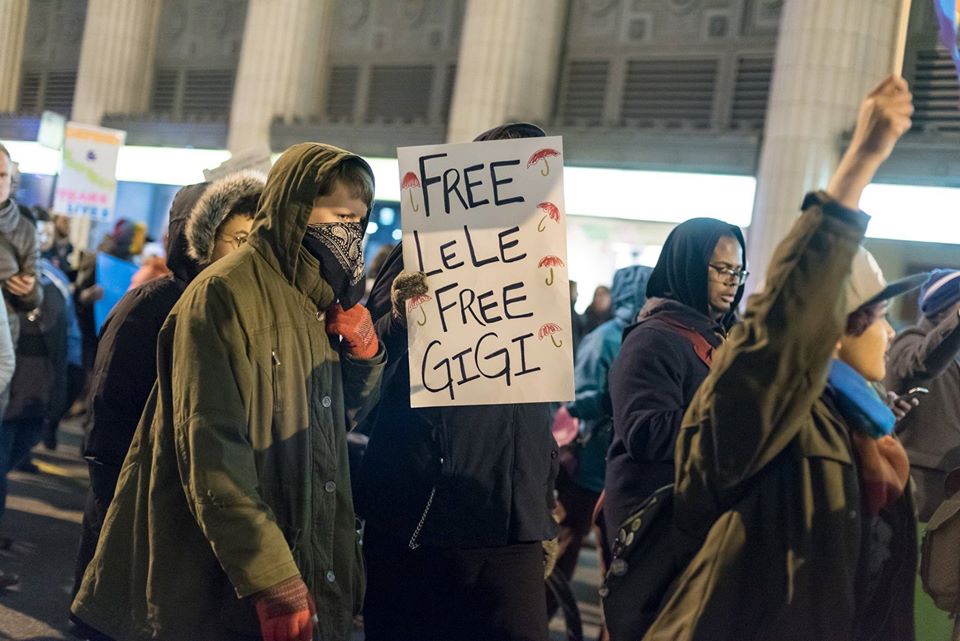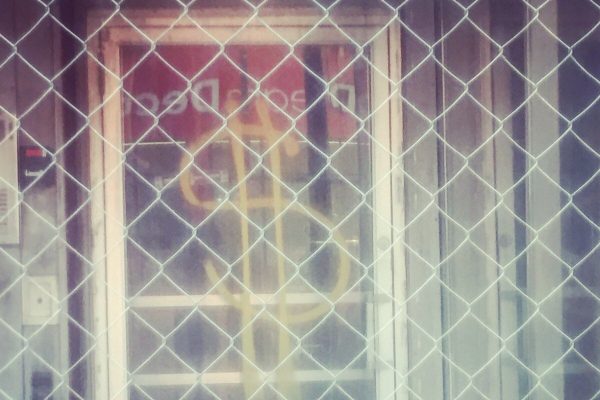“If U Only Knew How They Were Really Doing Us”: Inside/Outside Communication During A Pandemic

by Alisha Walker and Red Schulte (written by Red, with editing and considerable input from Alisha)
Alisha Walker is a 27-year-old former sex working person originally from Akron, Ohio. She was criminalized for an act of self-defense when a regular client threatened her life and the life of a fellow worker in January 2014. A jury convicted her of second-degree murder,and Alisha was sentenced to 15 years in prison. She is currently incarcerated at Decatur Correctional Center in Decatur, Illinois.
As Alisha commented, “When [Judge] Obbish sentenced me to 15 years, he basically said that I should have died that night when my client attacked me. He basically said that my life didn’t matter as much as that white man’s. My punishment is another example of the racist and whorephobic violence of the police, courts, and prisons.”
The violent combination of racism and whorephobia, coupled with her attacker Alan Filan’s familial connections to the Chicago political machine—specifically, Filan’s sister is a judge in Cook County and was very close with Judge James M. Obbish, who presided over Alisha’s case, and Filan’s brother is a famous Illinois lobbyist—are what Alisha attributes her harsh sentencing to.
The Support Ho(s)e Collective is a small Leftist formation of currrent and former sex workers and our trusted co-conspirators and accomplices based in Chicago and New York City. We founded and continue to coordinate the Justice for Alisha Walker Defense Campaign, supporting Alisha materially and advocating for her release. We’re currently a closed collective, meaning we don’t accept new membership. We’ve decided to remain closed until Alisha is free.
Inside/outside relationships are already fraught with surveillance, especially those relationships built on mutual aid and political organizing. Alisha and I are members of the Support Ho(s)e Collective. We’re also affiliated with Survived & Punished, Alisha as an inside survivor/organizer whose story has been uplifted, and I as an organizer with the NY formation. Alisha is in regular contact with the Uptown People’s Law Center, often encouraging others experiencing rampant sexual, medical, or gender-based discrimination inside to advocate for themselves alongside UPLC.
Alisha will be the first person to remind you that what happened to her is nothing new. She’ll be the first one to cite the long history of anti-sex worker stigma and criminalization. Early on when we talked about Mariame Kaba’s writings on Black women having “no self to defend” in this country, LeLe would light up with angry excitement. She’d exclaim, “Yeah, that’s exactly fucking right, they don’t want us to survive. But sometimes we do, and here I am.”
What follows is an accounting of conditions inside as Alisha and our other comrades have recounted them. We’ve pulled a selection of call summaries, video visits, and email correspondences to highlight what communication and organizing to meet Alisha and her community’s needs has been like since the pandemic hit.
**
Writing about surveillance experiences makes them real for people outside who’ve yet to be impacted by incarceration personally. We must detail the arbitrary cruelty of prisons and the mundane chaos that is always present in them, bearing down on our friends and comrades inside. Alisha’s ability to report to and communicate with outside organizers like myself and our fellow Support Ho(s)e comrades during this ongoing pandemic is essential. Alisha and I both believe that taking the lead from our most impacted community members—incarcerated people—during crises such as the COVID-19 pandemic will activate our networks to further our practices of mutual aid and care toward accessibility and freedom for us all.
Over the last two months, Alisha has used her allotted phone time to call us and give updates about herself, make sure we’re still alright out here, and update us on the prison’s ever-changing policy enforcements during the pandemic as well as the status of her entire unit. What has been consistent during these check-ins is uncertainty: uncertainty around the lack of precautions the prison is taking, about what this lockdown will bring, and how long we’ll all have to endure this pandemic moment.
“There’s no such thing as social distancing in prison.” Alisha begins and ends just about every call with this truth.
Our pandemic check-ins really began on Friday (March 13th). This was when Alisha was able to get word to us that Decatur Correctional Center was going on (what would be its first) pandemic) lockdown. All in-person visitation had been cancelled. Video visits were still tentatively going forward, but it was unclear if the GlobalTel Inmate Call (GTL) tech staff would be allowed into the prison for technical support and the administration of video visitation.
Alisha also mentioned during this call that Decatur’s GTL staff were working on installing a video visitation kiosk on the unit but no one had shared with the prisoners when it might be operational. Alisha also relayed that no one seemed to be sick yet, and that she and her friends on the on unit were being proactive and buying soap at commissary—the hand sanitizer they are offered at commissary has no alcohol content, which means it’s virtually ineffective.
By this point on the outside, the existing calls to “Free Them All” had multiplied, and new people were becoming activated and radicalized because of the public health crisis the pandemic posed. An email received from Alisha on March 14th informed us that all activities at the prison have been cancelled. This included all educational classes, contract work, certification courses, and their Shakespeare rehearsals. All that remained, for now, was “chow” and gym, but she also wrote that the COs had told them that those were the next activities to be cancelled. They were currently only being allowed two 20 minute phone calls a day.
On Wednesday, March 18th, Alisha and I had another check-in call. Her voice was bright and hopeful. Alisha let us know again that so far no one inside Decatur was sick or showing symptoms. Their commissary was still open; they were still able to go and shop for themselves, with soap still available for purchase (albeit at its typical exorbitant rate). Alisha’s tone shifted halfway through the call as she began to articulate her worries about her incarcerated family: “…because so many of them are immunocompromised and the ‘care’ we all receive inside here isn’t really care.” She was horrified by the news of some prisons, like the ones in New York, cutting off access to commissary and care-packages. She said, “We all rely on shopping to survive. How will they [those incarcerated in NY] survive without commissary?”
I told her about Survived & Punished NY’s expansion of our commissary giving along with other comrades to create a “Soap Brigade” and Abolitionist Mutual Aid Fund. She was ecstatic to hear this news, and expressed hope that it would catch on as an organizing trend. I assured her that it already had.
She also reported that regular phone use had been reinstated (though this would be short lived), and that gym and chow were still happening for now. Our video visits were still on, and she wanted to encourage everyone who didn’t already have a GTL account to set one up, as well as a Connect Network email, because people inside were feeling even more isolated without access to in-person visits while on lockdown.
Alisha said the prison was taking some precautions about the COs’ health, but she didn’t feel like it was enough to keep her safe. She had been following Illinois Gov. J.B. Pritzker’s public statements and efforts and was hopeful, but she also expressed that even when people get things right on the outside, people on the inside are the ones always left behind.
Alisha wanted to express support for the Chicago Community Bond Fund‘s actions and demands that everyone be released to prevent an outbreak at Cook County. She said, “Unless Cook County releases everyone, they’re condemning us in here to illness and likely death.” She was also very worried about friends and comrades at Logan Correctional—it was almost impossible to get word about their well-being.
Even though her Shakespeare theatre-troupe practice and her classes had been cancelled for now, she was practicing her lines, doing math problems, and working through her Introduction To Soil horticultural science text on her own time. She had gotten back into writing poetry and making art to process this new trauma of being trapped inside prison during a pandemic as well.
Those of us on the outside who are close to Alisha had already weathered her being put on “B Grade” with no access to email, phone calls (except for “legal calls” with lawyers), and video visits a few times before. We continue to endure retaliation from the mailroom COs who censor and lose her mail with abandon. We’ve been through so many versions of this communication breakdown and yet there are different fears and anxieties we’re holding because of this new contagion.
**



